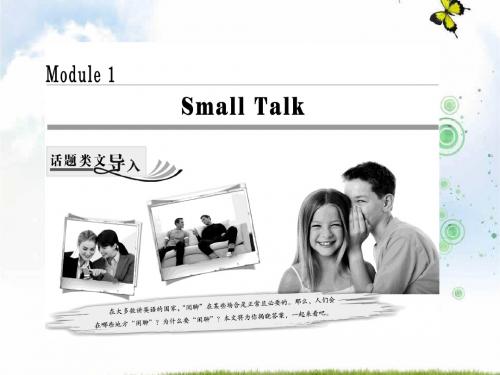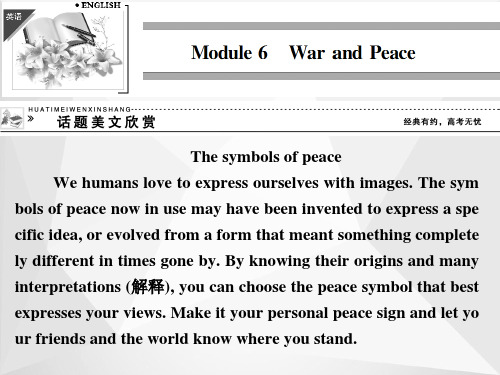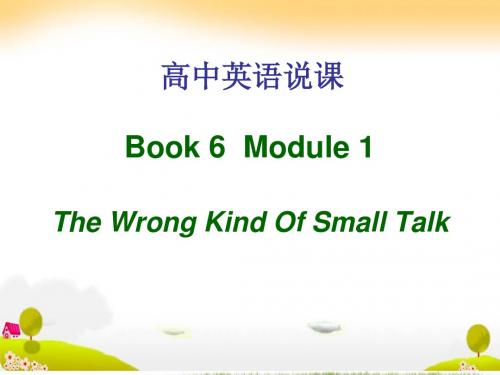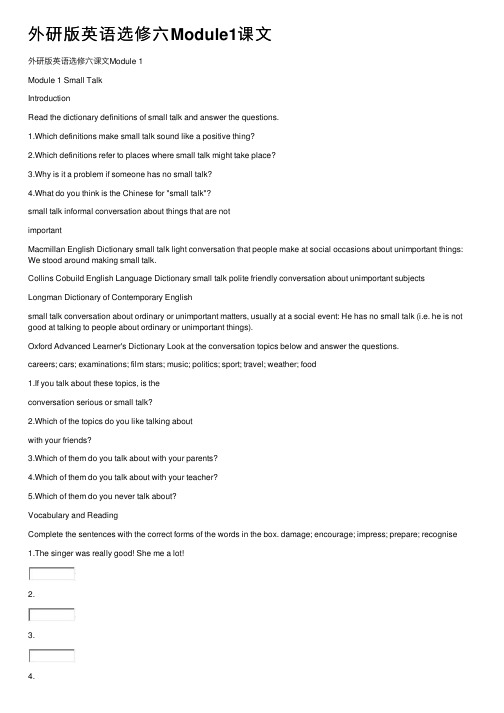【外研版】高中英语选修六:Module1 Introduction课件
高二英语选修6(外研版)课件2-1Introduction

Module 2
Fantasy Literature
2.hero n.(pl.~es)男主角,男主人公;英雄,偶像
①He's the hero of the novel. 他是该小说的男主人公。 ②We all think of him as a hero. 我们都认为他是英雄。 ③You're my hero. 你是我心中的偶像。
Module 2
Fantasy Literature
外 研 版 英 语
Module 2
Fantasy Literature
外 研 版 英 语
Module 2
类别
Fantasy Literature
课程目标要求掌握的项目
话题
fantasy literature and fiction stories
外 研 版 英 语
_________________________
答案:He likes a life full of adventure.
Module 2
Fantasy Literature
外 研 版 英 语
Module 2
Fantasy Literature
play a part
1)扮演某个角色 ①Who plays the part of Macbeth? 谁扮演麦克白? ②He will play an important part in the film. 他将在这部电影中扮演一个重要的角色。 2)担任……任务/职务 He played a leading part in the movement.
外 研 版 英 语
Module 2
Fantasy Literature
外研版选修六module1

Let the word fly 板块是帮助学生学习一 些一词多义、熟词生义的词汇。通过此 环节,学生可以对一些常见词的用法、 意思有一个全面的了解。在翻译过程中 体会词汇使用的丰富多彩。
think of body language look away from
social rules in addition
find out
对……焦虑不安 交朋友,建立友谊 身体语言,肢体语言 把目光从……移开 社交规则 想起,回忆起 了解,找到(信息) 除此之外,另外
Objectives
1. 本模块阅读课文是关于社交技能, 通过学习了解如何与人进行“small talk”。获取如何提高交谈能力方面 的信息。
试着翻译下面的英文,注意单词find的 用法。
1. Please find out when the train starts. 请查一下火车什么时候开。
2. Why did he find fault so much? 他为什么老是找麻烦?
3. As he is smart, he can’t find the answer to this question. 像他这样聪明,他也没能找到这个问题 的答案。
Module 1
Reading and Vocabulary
Before the class
I want you to be engaged in the material. I
wNaont ynoeucteossbaereinlygatgheidnikniwnhgaatebvoeruitt is tghIeawBtttwaeintnetgtaerrydeoaodutwitsectnounestbsviioenengre,yninbgwecalotagtrseesdrd. tihnatthIesay. NdtIramioo’nkawdtuietafwnnhntaleyieecehdckortvreaeieeiuvstratrsehyesylaa.nvtoarrwaoIieunelntorywertapdstidoahctairnittnastinhisagsttvkahikteiyvtoenhelroIefygaustatnhtaaehcboyatnwteo.ntigIevuemp’bastedaag.egasnrlWeeisteektodienvtertri.engeiiyagtnsaoeloguteetdos. Wddoriiswtcenudsowswihnnagwtihcnaatcnclaamnssam.kaekeyyoouuffeeeell oorr lBeleeatartnrernsoasmttoeemnthteiiontnhg,.ibnegt.ter understanding of
外研版高中英语选修六Module1SmallTalk课件

Answers to the questions above
• No, it doesn’t. • You could find out what the social conventions are
about arriving, leaving and bringing gifts. • “Did you watch the Cup Final last Saturday?”/
them to do better.
• Make sure youp_re__p_a_r_e_ for your English examination.
Do more homework!
• At the party, I _r_e_c_o_g__n_is__eda boy who used to attend
• Which definitions refer to places where small talk might take place?
• Why is it a problem if someone has no small talk?
• What do you think is the Chinese for small talk?
Ex 3 Read the passage again and • Accordinagntostwheearrttichlee, qshuoeulsdtpioeonpsle. plan
what they’re going to say at parties?
• What do people think about those who talk too much?
Dictionary
• Oxford Advanced Learner’s
高中英语选修6外研版课件:Module1+Period+One

Ⅲ.重点句式
1.主语+be+adj.+to do
And they are easy to learn(learn). 这些(技能)学起来很容易。
2.定语从句
think of topics that you would avoid if you were talking to strangers... 想一些当你和陌生人谈话时不会谈论的话题…… Listening is a skill which most people lack... 聆听是多数人缺乏的技巧…… look away from the person who is talking to you lk to a man about himself , and he will speak to you for hours! 和一个人谈论他自己,他就会和你说上几个小时!
课文预读
Ⅰ.课文判断正(T)误(F) 1.It is common to use small talk when you are waiting in a long lineup.( T ) 2.Religion is a safe topic when we make small talk.( F ) 3.It is rude for both children and adults not to make small talk with strangers.( F ) 4.It is impolite to interrupt a conversation in order to make small talk.( T ) 5.Politics is a topic which is controversial in small talk.( T )
As a rule,the conversation distance between two people is at least two or three feet.Standing at a closer range will make many Americans feel uneasy.
(完整版)外研版英语选修六Module1课文

外研版英语选修六课文Module 1 Module 1 Small TalkIntroductionRead the dictionary definitions of small talk and answer the questions.1.Which definitions make small talk sound like a positive thing?2.Which definitions refer to places where small talk might take place?3.Why is it a problem if someone has no small talk?4.What do you think is the Chinese for "small talk"?small talk informal conversation about things that arenot importantMacmillan English Dictionary small talk light conversation that people make at social occasions about unimportant things: We stood around making small talk.Collins Cobuild English Language Dictionary small talk polite friendly conversation about unimportant subjectsLongman Dictionary of Contemporary English small talk conversation about ordinary or unimportant matters, usually at a social event: He has no small talk (i.e. he is not good at talking to people about ordinary or unimportant things).Oxford Advanced Learner's DictionaryLook at the conversation topics below and answer the questions.careers; cars; examinations; film stars; music; politics; sport; travel; weather; food1.If you talk about these topics, is theconversation serious or small talk?2.Which of the topics do you like talking aboutwith your friends?3.Which of them do you talk about with your parents?4.Which of them do you talk about with your teacher?5.Which of them do you never talk about?Vocabulary and ReadingComplete the sentences with the correct forms of the words in the box. damage; encourage; impress; prepare; recognise1.The singer was really good! She me a lot!2.He had an accident and his bicycle.3.Don't shout at the children. You should them to do better.4.Make sure you for your English examination. Do morehomework!5.Read the passage and decide what kind of book it is from. Choose from this list.The text is from ____.a book to help you prepare for a speaking examinationa business coursean English teaching booka book which tells you what to do at social eventsHow Good Are Your Social Skills?Have you ever crossed the road to avoid talking to someone you recognise? Would you love to go to a party and talk confidently to every guest? Do you want to make more friends but lack the confidence to talk to people you don't know? And are you nervous about the idea of being at a social event in another country? Don't worry—we can help you!You needn't worry about situations like these if you have good social skills. And they are easy to learn. People with good social skills communicate well and know how to have a conversation. It helps if you do a little advance planning.Here are a few ideas to help you.Learn how to do small talkSmall talk is very important and prepares you for more serious conversations. Be prepared! Have some low-risk conversation openers ready. For example:•think of a recent news story—not too serious, e.g. a story about a filmstar or sports star•think of things to tell people about your studies•think of"safe" things you can ask people's opinions about—music, sport, films, etc.•think of topics that you would avoid if you were talking to strangers—and avoid talking about them! That way, you don't damage yourconfidence!Develop your listening skillsListening is a skill which most people lack, but communication is a two-way process—it involves speaking AND listening. Always remember—you won't impress people if you talk too much. Here are some ideas to make you a better listener:Do ...•show that you are listening by using encouraging noises and gestures—smiling, nodding, saying "uh-huh" and "OK", etc.•keep good eye contact•use positive body language•ask for more information to show your interestDon't ...•look at your watch•yawn•sigh•look away from the person who's talking to you•change the subject•finish other people's sentences for themAlways remember the words of Benjamin Disraeli, British Prime Minister in the nineteenth century: "Talk to a man about himself, and he will speak to you for hours!"Learn the rulesIf you go to a social occasion in another country, remember that social rules can be different. In some countries, for example, you have to arrive on time at a party; in other countries, you don't need to. In addition, you need to know how long you should stay, and when you have to leave. Some hosts expect flowers or a small gift, but in other places, you can take things, but you needn't if you don't want to. Remember also that in some countries, you mustn't take flowers of a certain colour, because they're unlucky. In most places, you don't have to take a gift to a party—but find out first!Answer the questions.1.According to the article, should people plan what they're going to say at parties?2.What do people think about those who talk too much?3.Describe two things you shouldn't do in a conversation.4.Why is it a good idea to nod and smile when the other person is talking?5.What does the quotation from Benjamin Disraeli tell you about people?Complete the sentences with the correct forms of the words in the box.sigh; yawn; nod; avoid; lack; smile1.personal questions.2.meet people from other countries.3.head in agreement.4.I think the man I spoke to was tired—5.answered me.6.shook my hand.Look at the phrases from the passage and answer the questions.1.If you can talk confidently, does this mean that you are worried about talking topeople?2.What kind of advance planning could you do before going to a party in a foreigncountry?3.Can you give an example of a low-risk conversation opener if you were talking toa friend of your parents', for example?4.What encouraging noises and gestures can you make when you're having aconversation in Chinese?5.What is an example of positive body language?6.Are social rules the same in every country?Discuss your answers to the questions.1.Which of the ideas in the reading passage do you think are useful in your society?2.Are there any conversation techniques that you think you will use in the future?3.Which of the listening skills are you good at?4.Which of the social skills do you need to improve?5.What are some of the usual small talk topics in China?FunctionRead the pairs of sentences and answer the questions.1.You must arrive on time at a party.You have to arrive on time at a party.2.You mustn't take yellow flowers for the host.You don't have to take yellow flowers for the host.3.You don't have to take a gift.You don't need to take a gift.1. Which of the following is true about the first pair of sentences?The first one is an obligation, the second one is a suggestion.They both indicate an obligation.They are only suggestions about what to do.2. Which of the following is true about the second pair of sentences?The first one indicates that something is against the law.They mean the same thing.The first one is an obligation, the second one indicates a lack ofobligation.3. Which of the following is true about the third pair of sentences?The second one is an obligation, the first one isn't.They mean the same thing.The first one is an obligation, the second one isn't.Write three rules for a social event in your country.If you go to a social event in my country,1.you have to ____.2.you don't have to ____.3.you mustn't ____.4.Look at the two sentences and decide which explanation is correct.1. We all know each other. We don't need to worry about small talk. Thismeans ____.it isn't necessary to worry about itunfortunately we worry about it2. The party is informal. You needn't wear a tie. This means ____.we must not wear a tiewe can wear a tie if we chooseComplete the sentences with verbs to express obligation or lack of obligation.1.2.3.been given.4.5.you do.Reading and ListeningRead and match the conversations with the places. There is one extra place.at a summer school; during a job interview; in a business meeting; on a boatA: Wonderful, aren't they?B: Er ... I'm sorry?A: The cliffs.B: Oh, yes, they are.A: Been here before?B: Pardon?A: So ... you wrote in your application form that you're interested in mountains. B: Yes.A: Have you ever climbed a mountain?B: No.A: Have you ever read any books about mountain-climbing?B: No.A: When did you arrive?B: Yesterday.A: Nice journey?B: Very nice.A: Did the immigration people ask to see your visa?B: I didn't need to get a visa.A: Really? Why not?B: Because I was born here.A: Oh yes, of course!Answer the questions about the conversations.1.Do you think the conversations are between people who know eachother? Give reasons for your answers.2.Which of the conversations would you call small talk?3.What do you think about the answers in the interview?a.The answers show that the interviewee is interestedin the job.b.The answers are too short.c.The answers are impolite.Listen to the whole of the first conversation and answer the questions.1.Do the people both speak English as a first language?2.Why did the woman have problems understanding what the manwas saying?3.How did the man help her to understand him better?4.Listen and check. Choose the correct endings to the lines from theconversation.1. Sorry, I couldn't ____.hear what you saidunderstand what you said2. I didn't ____.like what you saidcatch what you said3. Could you ____?repeat what you saidexplain what you said4. You needn't have ____.spoken to mespoken so slowly5. I just needed a few seconds ____.to get used to your voiceto understand your voiceGrammarRead the sentence from the listening passage and answer the questions.You needn't have spoken so slowly.1. Who said this?the touristthe English person2. Why did she say it? Choose one of these possible reasons.The other person was speaking too quickly.The other person was speaking too slowly.The other person was speaking slowly and it wasn't necessary.Rewrite these sentences using needn't have done.1.It wasn't necessary for you to bring some flowers!You needn't have brought some flowers.2.Thank you for tidying the room—but it wasn't necessary.3.There was no need for you to buy the box of chocolates.4.Why did you go to school? It's Sunday!5.Thank you for bringing the book to show me, but I already have it.Read the sentence and decide which endings are possible.I didn't need to buy a gift for my host family ____.so I didn't get onebecause I already had oneso I bought oneso I took it back and got a refundComplete the sentences using didn't need to or needn't have done. Example: It was an informal party so I didn't need to wear (wear) a suit.1.We brought some food to the party but there was too much, so we2.speech for him.3.(wait) outside in the street.4.I got to the party at 6 p.m. but there was no one there, so I5.I told the host all about my home town and then he told me he'dReading and WritingRead the email.Hi! How are you? I hope you and your family are well.I have a favour to ask. Next week, I'm going to a reception at the Chinese Embassy here in London and I'm really looking forward to it. I'm going to meet some senior high school students and their teachers. The only problem is that I'm not very good at small talk with people I don't know—I'm always worried about saying the wrong thing or making people feel bored.I need to know what I can talk about with the Chinese people that I meet. I wonder if you would be kind enough to answer these questions.Here in England, there are certain questions that you shouldn't really ask people that you don't know—"How old are you?" for example, and "How much do you earn?" Are there any questions that you shouldn't ask people in China?What sort of things do Chinese teenagers like talking about? Sport? Music? Films? And what sort of things do they find boring? Politics? The weather?Looking forward to your reply.AlexWrite a reply. Answer the main questions and offer other advice. Use some of the following sentences to start and finish your email.•Very nice to hear from you.•Thank you for your interesting email.•How are you? It's a long time since I heard from you.•I hope this information has been useful.•Best of luck at the Chinese Embassy.•Looking forward to hearing from you again soon.Reading and VocabularyYou're going to read a story about a saleswoman. Discuss what kind of small talk you need as a salesperson.The Wrong Kind of Small TalkEsther Greenbaum was a saleswoman for a firm of fax machines and business supplies. But she was also the most outspoken human being in the world—well, Westchester County, at least. Her motto was "Every time I open my mouth, I put my foot in it."Esther Greenbaum's major shortcoming was that she had a complete absence of small talk. No, that's not quite true. She had small talk, but it was the wrong kind. In fact, she had never learnt the basic rules of social communication, and as a consequence, she made systematic mistakes every time she opened her mouth. It was no coincidence either that she wasn't a very good saleswoman.One day during a meeting, Esther was introduced to an important customer, a mature woman."Nice to meet you," she said. "How old are you?" The customer looked awkward."Forty? Forty-five?" said Esther. "You look much older. And your friend ... she's older than you, but she looks much younger!"On another occasion, Esther teased a typist, "Hey! When's your baby due?"The typist went red and contradicted Esther. "Actually, I'm not pregnant," she said."Oh, sorry," said Esther without any apology. "Just putting on a little weight, huh?"Esther was never cautious about other people's feelings. One of her acquaintances, a salesman in the firm, was going through a very messy divorce and was very depressed. She tried to cheer him up."Forget her! She was a complete fool. No one liked her anyway."Much of the time, Esther said the first thing to come into her head. One day at work, a clerk came into the office with a new hairstyle."Nice haircut," said Esther. "How much did it cost?"The woman replied, "I'd rather not say."Esther replied, "Well, anyhow, either you paid too much or you paid too little."She met a very famous writer once. "Hey, what a coincidence!" she said. "You're writing a book and I'm reading one!"The trouble with Esther was she said what she thought, and didn't think about what she said. A young man was trying to be modest about his new job many miles away."I guess the company chose me so they'd get some peace in the office," he smiled."No, I guess they chose you to discourage you from spending your whole career with us," Esther replied sweetly.Once, Esther went to a brunch party to meet some old school friends on the anniversary of their graduation. She greeted the hostess."Do you remember that guy you were dating? What happened to him?" she asked. "You know, the ugly one."At that moment, a man came up and stood by her friend. "Esther, I'd like you to meet my husband," she said. "Charles, this is ..."Esther interrupted her, "Hey, so you married him!"Read the passage and answer the questions.1.What did Esther often do when she spoke to others?2.What do you think are "the basic rules of social communication"?3.Why did the customer look awkward when she was asked how oldshe was?4.How did the typist contradict Esther?5.What was wrong about Esther's advice to the salesman?6.What did Esther think of the clerk's haircut?7.Why did the young man think the company gave him a new jobmiles away?8.What did Esther think of her old school friend's husband?Read the passage and find:1.three things you can say when you make small talk2.two things you should not say3.one way of replying to questions which you don't wish to answer4.The style of this passage is meant to be humourous and exaggerated.Example:You look much older. And your friend, she's older than you, but she looks much younger!5.Look for more examples of humour and exaggeration in the passage.Look at the new words in the box.absence; acquaintance; anniversary; apology; awkward; brunch; cautious; clerk; customer; fax; firm; fool; haircut; hostess; human being; interrupt; mature; messy; motto; outspoken; pregnant; saleswoman; shortcoming; tease; typistFind words for:1.2.3.4.5.6.Note: Not all the words fit these categories.Answer the questions about the words in the box.absence; acquaintance; anniversary; apology; awkward; brunch; cautious; clerk; customer; fax; firm; fool; haircut; hostess; human being; interrupt; mature; messy; motto; outspoken; pregnant; saleswoman; shortcoming; tease; typist1.When is the next important anniversary in your life?2.Do people ever tease you?3.Can you think of a personal motto?4.When was the last apology you have given or received?5.What are you cautious about?6.Do you know anyone who is outspoken?Discuss the questions and give reasons for your answers.1.Is small talk important in your society?2.Is it as important as "real" conversation?3.Do you think small talk is more or less important in English than inyour language?Reading PracticeLook at the title of the passage and the words in the box. Choose five words and guess what the writer uses them to say.argument; compliment; conversation; curious; disagreement; dull; embarrassment; factual; genuine; hospitable; lively; relationship; sensitive; secretive; silence; spy; topic; violate; wealthMaking Friends in the USAIn the USA, conversation is less lively than in many other cultures, where everyone talks at the same time. When someone talks, everyone is expected to listen, no matter how dull the person's speaking may be.If you're not sure what to talk about, you can ask what people do. We're defined by our jobs and we're usually happy to talk about them, unless you're a spy!Some people say that Americans talk about their feelings more than Asians, but are more secretive about factual matters. You can safely ask questions about families, where you come from, leisure interests, as well as the latest movies. We're interested in people's ethnic background too. But it's best to avoid politics, religion and other sensitive topics.A highly personal conversation can take place after a very short period of knowing someone, but this doesn't mean that you're close friends, or the relationship is very deep. But a lot of people are very friendly and hospitable, and the famous invitation "If you're ever in Minneapolis / San Diego / Poughkeepsie, do call by and see us!" is never made without a genuine desire to meet again.But while few Americans will worry about the questions you may ask, particularly if you clearly show you're aware of cultural differences, they may hesitate before they ask you similar questions. In fact, it's a sign that they don't wish to violate your private life. So, many Americans will talk about safe topics because they don't dare to be too curious or personal, but will happily talk about more private matters if you take the lead.Generally we dislike arguments, and we avoid topics which lead to disagreement. It's easy to return to discussing the weather: "Do you like the USA? How do you like the weather?" or making compliments: "What lovely flowers and what a beautiful vase!" "That's a fabulous dress you're wearing." You should accept compliments graciously and say "Thank you!"There are a couple of dangerous topics of conversation: age and money. Age is not treated as something very special, unless someone is very old: "Isn't she wonderful for her age!" and there are no special rules or signs of extra respect for elderly people. Anyway, Americans always want to look younger than they really are, so don't expect an accurate reply!Income is a very private matter, and you'd do well to avoid asking how much people earn, although some people may not only be open about it, but show off their wealth. We don't ask how much things cost, either.But what we don't like is silence, and almost anything is better than the embarrassment of a quiet party and silent guests.Read the advice on small talk. Is it true for you?1.You can ask about families, what people do and like, etc.2.It's OK to talk about religion and politics.3.You shouldn't talk about your feelings.4.Don't ask personal questions.5.Make sure you don't talk about the weather or give compliments.6.You can talk about people's age and their income.7.Choose the correct answers.1. When a dull person talks, you should ____.not ask personal questionsask questionschange the topic of conversationlisten2. It's always OK to talk to Americans about ____.age and moneytheir workreligion and politicstheir private life3. When Americans make an invitation to visit, ____.they genuinely want to see you againthey don't really mean itThey want to find out more about youyou should accept it4. The best way to talk about personal things is to ____.discuss the weathertalk about your own private life firsttalk about your jobask them how old they are5. It's best to avoid ____.spiespersonal questionssilencedull peopleComplete the sentences in your own words.1.Conversation is less lively in the USA because everyone ____.2.Americans are happy to talk about family and personal interests,but ____.3.If you show you're aware of cultural differences, ____.4.You shouldn't ask how old people are because ____.5.Although some people like to show off their wealth, ____. Cultural CornerRead the passage and answer the questions.1.How does the AAA model work?2.Is the AAA model a good idea while making small talk withsomeone you don't know in China?The AAAIt is estimated that 80% of all conversation in English is small talk. A very important function of small talk is to establish a relationship between people who don't know each other very well, or don't know each other at all.Psychologists say that the most successful formula for small talk between people like this is the AAA model. AAA = answer, add and ask. This is how it works.Imagine a situation where two strangers are talking to each other after someone they both know has left the room, or the café or party, etc. The first person asks a question: A: Do you live near here?The second person replies by answering the question, adding some extra information and then asking another question: B: (Answer) Yes, I do. (Add) In an apartment on Brown Street.(Ask) Do you live nearby too?The first person does the same, answer, add and ask: A: (Answer) No, I live in Bristol.(Add) I'm just visiting London.(Ask) Have you lived here long? B: (Answer) Not so long.(Add) I moved here three years ago.(Ask) What's the purpose of your visit to London?The speakers may have difficulty at first, but they soon realise that the important thing is that they are saying something. By continuing with the AAAmodel, the conversation continues. Because the thing they both want to avoid is an embarrassing silence.The conversation can continue in this way for a long time. However, something can happen that completely changes the atmosphere. B: Why do you live in Bristol? A: I'm studying there. History. Are you a student? B: Yes. And I know some people who are studying at Bristol. Do you know a girl called Helen Brown? A: Helen Brown!! Yes! She's one of my best friends! How do you know her? B: She's my cousin.At this point, the AAA model stops. Because they used this very useful social technique, they found something they have in common at last.。
外研选修六module1词汇课件(共33页ppt)

Appreciation
• In the middle of every difficulty lies opportunity. ----Albert Einstein
2. Trouble is only opportunity in work clothes. ----H.J. Kaier
3. The pessimist sees difficulty in every opportunity. The optimist sees the opportunity in every difficulty. ----Winston Churchill
small talk lilgighhttconversation that people make at social occasions about unimportant things: we stood around making small talk.
--- Collions Cobuild English Language Dictionary
--- Macmillan English Dictionary
small talk ppooliltiteeffrrieiennddlylyconversation about unimportant subjects --- Longman Dictionary of Contemporary English
外研版高中英语选修6全套PPT课件

(3)be certain to do sth.一定会做某事
She is certain to come.她一定会来。
I
am
certain
that
she
will
come.我确信她会来。
(4)be certain of sth.确信……
better to be sure than sorry.
A.inspired
B.satisfied
C.calm
D.certain
【解析】 由后句“确保有把握比道歉 好”可知:一定要等到更有把握的时候。
【答案】 D
absence n.不在,缺席,缺乏,缺 少
absence of mind心不在焉 in the absence of sb.=in one’s absence某 人不在时
足,缺乏……。句意为:我们由于资金
不足必须放弃这项计划。
【答案】 D
advance [C] 前进,进展,进行;v. 前进,促进
in advance预先,事先 pay in advance预先付款 stop the enemy’s advance阻止敌军前进 advance planning/warning/booking 预先的 计划/警告/订票
想起,回忆起
3.look _____ afrwomay 把目光从……移开
4.in ______a_d_dition 另外,除此之外
5.find ____ out
了解(到),找出(信息)
6.as a ______c_o_n_s_e_q_uenc因e 此,结果
高中(外研版)英语选修6课件:module 1 section 1

Step One:Warming up
1.In which photo do you think they are making small talk?
_______________________________________________ _______________________________________________ 答案: Picture A and C.
4.The author thinks that________according to the text. A.the majority of people don’t have good listening skills B.when listening to the other person,you should keep silent and not get in any word C.if you know what the speaker will say,you can speak it out for him or her D.communication is just a matter of speaking 答案: A
2.What did Benjamin Disraeli mean by saying “Talk to a man about himself,and he will speak to you for hours!”?
A.People dislike talking about themselves. B.People like talking about themselves. C.A man likes speaking to himself. D.A man dislikes speaking to himself. 答案: B
外研版高中英语选修六Module1Readingandintroduction课件

• Oxford Advanced Learner’s
Dictionary
Read the dictionary definitions of
small talk and answer the questions
• Which definitions make small talk sound like a positive thing?
while listening
• Part 4 (Paras. 7-8) The social rules
Fast reading Ex 2
Read the passage and decide what kind of book it is from. Choose from. Choose from this list. • 1 an English teaching book • A business course • A book which tells you what to do at social events • A book to help you prepare for a speaking examination
• Which definitions refer to places where small talk might take place?
• Why is it a problem if someone has no small talk?
• What do you think is the Chinese for small talk?
• What encouraging noises and gestures can you make when you’re having a conversation in Chinese?
高二英语选修6(外研版)课件3-1Introduction

知识拓展
1)常与trust搭配的短语有: have trust in 对„„信任 put no trust in 对„„不信任 fulfil one's trust 尽职尽责 2)辨析:trust, believe, believe in ①trust sb.指相信某人的品德、为人、能力等。 ②believe sb. 指相信某人说的话。
外 研 版 英 语
功能
语法
Module 3 Interpersonal Relationships-Friendship
外 研 版 英 语
Module 3 Interpersonal Relationships-Friendship
外 研 版 英 语
Module 3 Interpersonal Relationships-Friendship
外 研 版 英 语
①I can't trust her with my car.
=I can't trust my car to her. 我不能托她保管我的车。
Module 3 Interpersonal Relationships-Friendship
②You might trust her to do the work.
外 研 版 英 语
She came close to him.
她走近他。
Module 3 Interpersonal Relationships-Friendship
词语辨析
close与closely 二者都可作副词用:close指位置上的接近;closely表 示抽象的“密切地,紧紧地”。 ①Move close, so I can see your eyes. 靠近些,那样我可以看见你的眼睛。 ②They are closely related. 他们关系密切。
高二英语选修6(外研版)课件1-1Introduction

Module 1
Small Talk
外 研 版 英 语
Module 1
Small Talk
外 研 版 英 语
Module 1
Small Talk
外 研 版 英 语
make friends, (be)nervous about, think of, leave out, look away from, in addition, find out, cheer sb. up, (be)aware of, show off, get used to 功能
Module 1
Small Talk
即学即用
You should take this medicine following the________on the bottle. A.information B.explanations C.instructions D.definitions 答案:C
外 研 版 英 语
②positive thinking 必胜的思想
Module 1 Small Talk 5)彻底的;绝对的;完全的 ①Her behaviour was a positive outrage. 她的行为残暴到了极点。 ②It was a positive miracle that we arrived on time.
我们能够及时赶到,这简直是奇迹。
6)(指试验或实验的结果)表明存在某物质的,阳性的 ①a positive reaction 阳性反应
外 研 版 英 语
②The tests proved positive.
高中英语外研版选修六课件:Module+1+Section+Ⅰ+Introduction+&+Reading+—+Pre-reading

[读文清障] ⑱develop vt.提高, 使……发展; 培养; 培育;开采;冲洗 ⑲which 引导定语从句,修饰 a skill。 ⑳twoway adj.双向的 21 process n.过程 ○ 22 involve v. ○ 涉及, 牵连, 常用 involve doing sth.表示“涉及做某事”。 be involved in 卷入……中,涉及 be involved with 和……有联系 23 impress v.给……留下印象 ○ impress sth. on sb. 使某人了解某事 impress sb. with sth. 某事给某人留 下印象
Where do people make small talk? People make small talk just about anywhere, but there are certain places where it is very common.Most often, small talk occurs in places where people are waiting for something.For example, you might chat with another person who is waiting for the bus to arrive.People also make small talk in a doctor’s or dentist’s waiting room, or in queue at the grocery store. At the office, people make small talk in elevators or lunchrooms and even in restrooms, especially if there is a lineup.Some social events (such as a party) require small talk among guests who do not know each other very well.It is called “mingling” when people walk around in a social setting and talk to a variety of people.
秋外研版高中英语必修一课件:M1 Introduction(共26张PPT)

PE
5P.EWahnidchITof them are not academic
physics IT
(学术的) subjects? 6o.pWenhich are your favorite subjects?
Complete the sentences with the help of P1 2 the words in the box.
hope that one day we will be
amply rewarded. 就像一个专心致志进行探索的科 学家那样,我们必须抱有这样的 希望,终有一天,我们的努力会 取得丰硕的成果。
Homework
Read the passage and preview the new words and expressions on Page 2&3.
You may do like this: answers with your 1. I like _______ because _c_l_a_s_s_m_a_t_e_s_..
2. I think __W__h_a_t_’s__y_oiusrimoppoinritoannt because _a_b_o_u_t__t_h_e__s_u.bjects?
4 Maths Chinese
Aftern oon
5 Maths 6 Geography 7 Music
Maths PE
Politics
Art Chinese English English
English Chemistry
PE English
Chinese History
Chinese
IT
Discuss your
•9、要学生做的事,教职员躬亲共做;要学生学的知识,教职员躬亲共学;要学生守的规则,教职员躬亲共守。2021/9/82021/9/8Wednesday, September 08, 2021 •10、阅读一切好书如同和过去最杰出的人谈话。2021/9/82021/9/82021/9/89/8/2021 8:20:58 PM •11、只有让学生不把全部时间都用在学习上,而留下许多自由支配的时间,他才能顺利地学习……(这)是教育过程的逻辑。2021/9/82021/9/82021/9/8Sep-218-Sep-21 •12、要记住,你不仅是教课的教师,也是学生的教育者,生活的导师和道德的引路人。2021/9/82021/9/82021/9/8Wednesday, September 08, 2021
高中英语外研版选修6【配套课件】Module1-6-6-1

1.佳句仿写 ①他有可能会赢得一等奖。(be likely to do sth) He _i_s___ _l_ik__el_y___ _t_o__ _w__in__ the first prize. ②那些孩子们跑出房间,愉快地笑着、说着。(现在分词作 伴随状语) The children ran out of the room, l_a_u_g_h_i_n_g_ __a_n_d__t_a_lk_i_n_g__ _h__a_p_p_il_y_. 2.翻译佳句 放眼高考 By knowing their origins and many interpretations (解释), you can choose the peace symbol that best expresses your views. _通__过__了__解__它__们__的__起__源__和__多__种__解__释__,__你__可__以__选__择__最__能__表__达____ _你__的__想__法__的__和__平__符__号__。__
7._la_s_t_____ v.to continue for a particular length of time
Ⅱ.短语天地 1._d_e_c_la_r_e_w__a_r_o_n____向……宣战 2._m_a_k_e__a_b_r_e_a_k_t_h_r_o_u_g_h___取得重大突破(进展) 3._p_ic_k__u_p_________停下来让某人搭车/船,救起 4.be situated on/at____位__于______ 5.get off_下__车__;__动__身___
(2)From the passage, we know________took the most dange
高中英语外研版选修六Module1说课+(共12张PPT)

The Wrong Kind Of Small Talk
Part 1 The analysis of the teaching material and the students.
Part2. Teaching aims
The Wrong Kind of Small Talk
Part 5 Blackboard design
Part 3.
Studying and teaching methods
Part 4. Teaching procedures(7)
Step1: Lead –in
Is the girl good at small talk?
The activity aims: use a part of short act familiar to the students to introduce the topic of the passage.
they can use reading materials in page 2 and 3 or from other articles
Step 6: Role Play
• Suppose Esther has learnt the skills of small talk. Imagine that she is on the anniversary of the graduation and she meets her former deskmate with her husband, who Esther also knew years The activity aim: give ago. Make a dialogue of three people students opportunity to use with no less than ten sentences their imagination and skills . just talked about
外研版英语选修六Module1课文

外研版英语选修六Module1课⽂外研版英语选修六课⽂Module 1Module 1 Small TalkIntroductionRead the dictionary definitions of small talk and answer the questions.1.Which definitions make small talk sound like a positive thing?2.Which definitions refer to places where small talk might take place?3.Why is it a problem if someone has no small talk?4.What do you think is the Chinese for "small talk"?small talk informal conversation about things that are notimportantMacmillan English Dictionary small talk light conversation that people make at social occasions about unimportant things: We stood around making small talk.Collins Cobuild English Language Dictionary small talk polite friendly conversation about unimportant subjects Longman Dictionary of Contemporary Englishsmall talk conversation about ordinary or unimportant matters, usually at a social event: He has no small talk (i.e. he is not good at talking to people about ordinary or unimportant things).Oxford Advanced Learner's Dictionary Look at the conversation topics below and answer the questions.careers; cars; examinations; film stars; music; politics; sport; travel; weather; food1.If you talk about these topics, is theconversation serious or small talk?2.Which of the topics do you like talking aboutwith your friends?3.Which of them do you talk about with your parents?4.Which of them do you talk about with your teacher?5.Which of them do you never talk about?Vocabulary and ReadingComplete the sentences with the correct forms of the words in the box. damage; encourage; impress; prepare; recognise 1.The singer was really good! She me a lot!2.3.4.homework!5.Read the passage and decide what kind of book it is from. Choose from this list.The text is from ____.a book to help you prepare for a speaking examinationa business coursean English teaching booka book which tells you what to do at social eventsHow Good Are Your Social Skills?Have you ever crossed the road to avoid talking to someone you recognise? Would you love to go to a party and talk confidently to every guest? Do you want to make more friends but lack the confidence to talk to people you don't know? And are you nervous about the idea of being at a social event in another country? Don't worry—we can help you!You needn't worry about situations like these if you have good social skills. And they are easy to learn. People with good social skills communicate well and know how to have a conversation. It helps if you do a little advance planning.Here are a few ideas to help you.Learn how to do small talkSmall talk is very important and prepares you for more serious conversations. Be prepared! Have some low-risk conversation openers ready. For example:?think of a recent news story—not too serious, e.g. a story about a film staror sports starthink of things to tell people about your studiesthink of"safe" things you can ask people's opinions about—music, sport,films, etc.think of topics that you would avoid if you were talking to strangers—andavoid talking about them! That way, you don't damage your confidence! Develop your listening skillsListening is a skill which most people lack, but communication is a two-way process—it involves speaking AND listening. Always remember—you won't impress people if you talk too much. Here are some ideas to make you a better listener:Do ...show that you are listening by using encouraging noises and gestures—smiling, nodding, saying "uh-huh" and "OK", etc.keep good eye contactuse positive body languageask for more information to show your interestDon't ...look at your watchyawnsighlook away from the person who's talking to youchange the subjectfinish other people's sentences for themAlways remember the words of Benjamin Disraeli, British Prime Minister in the nineteenth century: "Talk to a man about himself, and he will speak to you for hours!"Learn the rulesIf you go to a social occasion in another country, remember that social rules can be different. In some countries, for example, you have to arrive on time at a party; in other countries, you don't need to. In addition, you need to know how long youshould stay, and when you have to leave. Some hosts expect flowers or a small gift, but in other places, you can take things, but you needn't if you don't want to. Remember also that in some countries, you mustn't take flowers of a certain colour, because they're unlucky. In most places, you don't have to take a gift to a party—but find out first!Answer the questions.1.According to the article, should people plan what they're going to say at parties?2.What do people think about those who talk too much?3.Describe two things you shouldn't do in a conversation.4.Why is it a good idea to nod and smile when the other person is talking?5.What does the quotation from Benjamin Disraeli tell you about people?Complete the sentences with the correct forms of the words in the box.sigh; yawn; nod; avoid; lack; smile1.2.other countries.3.4.I think the man I spoke to was tired—5.6.Look at the phrases from the passage and answer the questions.1.If you can talk confidently, does this mean that you are worried about talking to people?2.What kind of advance planning could you do before going to a party in a foreign country?3.Can you give an example of a low-risk conversation opener if you were talking to a friend of your parents', for example?4.What encouraging noises and gestures can you make when you're having a conversation in Chinese?5.What is an example of positive body language?6.Are social rules the same in every country?Discuss your answers to the questions.1.Which of the ideas in the reading passage do you think are useful in your society?2.Are there any conversation techniques that you think you will use in the future?3.Which of the listening skills are you good at?4.Which of the social skills do you need to improve?5.What are some of the usual small talk topics in China?FunctionRead the pairs of sentences and answer the questions.1.You must arrive on time at a party.You have to arrive on time at a party.2.You mustn't take yellow flowers for the host.You don't have to take yellow flowers for the host.3.You don't have to take a gift.You don't need to take a gift.1. Which of the following is true about the first pair of sentences?The first one is an obligation, the second one is a suggestion.They both indicate an obligation.They are only suggestions about what to do.2. Which of the following is true about the second pair of sentences?The first one indicates that something is against the law.They mean the same thing.The first one is an obligation, the second one indicates a lack ofobligation.3. Which of the following is true about the third pair of sentences?The second one is an obligation, the first one isn't.They mean the same thing.The first one is an obligation, the second one isn't.Write three rules for a social event in your country.If you go to a social event in my country,1.you have to ____.2.you don't have to ____.3.you mustn't ____.4.Look at the two sentences and decide which explanation is correct.1. We all know each other. We don't need to worry about small talk. This means ____.it isn't necessary to worry about itunfortunately we worry about it2. The party is informal. You needn't wear a tie. This means ____.we must not wear a tiewe can wear a tie if we chooseComplete the sentences with verbs to express obligation or lack of obligation.1.2.3.been given.4.5.you do.Reading and ListeningRead and match the conversations with the places. There is one extra place. at a summer school; during a job interview; in a business meeting; on a boatA:Wonderful, aren't they?B:Er ... I'm sorry?A:The cliffs.B:Oh, yes, they are.A:Been here before?B:Pardon?。
- 1、下载文档前请自行甄别文档内容的完整性,平台不提供额外的编辑、内容补充、找答案等附加服务。
- 2、"仅部分预览"的文档,不可在线预览部分如存在完整性等问题,可反馈申请退款(可完整预览的文档不适用该条件!)。
- 3、如文档侵犯您的权益,请联系客服反馈,我们会尽快为您处理(人工客服工作时间:9:00-18:30)。
Longman Dictionary of Contemporary English
(3) light conversation that people make at social occasions about unimportant things: We stood around making small talk.
light informal
Write a short passage of your personal thought about small talk.
Read the dictionary definitions of small talk.
(1) informal conversation about things that are not important
Macmillan English Dictionary
(2) polite friendly conversation
闲谈,聊天.
Look at the conversation topics below and answer the questions according to your own points. 1. careers 2. cars 3. examinations 4. film stars 5. music 6. politics 7. sport 8. travel 9. weather 10. food
The Collins/Oxford definitions.
Why is it a problem if someone has no small talk?
They find it difficult to make new friends.
What do you think is the Chinese for “small talk”?
Collins Cobuild English Language Dictionary
(4) conversation about ordinary or unimportant matters, usually at a social event: He
has no small talk (i.e. he is not good at talking to people about ordinary or unimportant things). Oxford Advanced Learner’s Dictionary
Discussion
Talk with your partners what the characteristics of small talk are.
Small Talk
Features Reasons
talking about unimportant things happening at a party
Answer the questions.
Which definitions make small talk sound like a positive thing?
The Longman definition.
Which definitions refer to places where small talk might take place?
If you talk about these Which of the topics Which of them do you Which of them do you Which of them do you topics, is the do you like talking talk about with your conversation serious about with your never talk about? talk about your parents? or small talk? teacher? friends?
